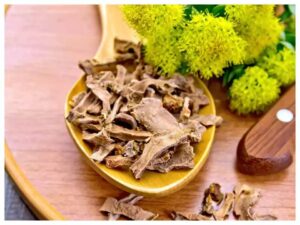Ginseng: An Herbal Remedy with Numerous Health Benefits
Ginseng is an herbal remedy that has been used for centuries for its numerous health benefits. This root has been used to treat a wide range of conditions and improve overall health. In this article, we will explore the benefits of ginseng, research supporting its use, historical use in traditional medicine, the nutritional components, core ingredients, methods for consumption, dosage guidelines, folk remedies, and potential side effects and precautions to consider when using ginseng.
Ginseng: The Ancient Herb that was Discovered Centuries Ago
Ginseng, the popular medicinal herb, has a long and fascinating history that dates back several centuries. This plant, native to Asia and North America, has been used for thousands of years for its various health benefits and continues to be one of the most sought-after herbs in the world. But how did ginseng first come to be used and discovered.
The Origins of Ginseng
Ginseng is believed to have originated in the mountains of Northeast Asia and has been used in traditional Chinese medicine for thousands of years. It is a slow-growing plant that has a long life span and is known for its ability to adapt to a variety of growing conditions. The plant’s root is the most commonly used part for medicinal purposes, but other parts of the plant, such as the leaves and stems, are also sometimes used.
The Discovery of Ginseng
The first recorded use of ginseng dates back to the ancient Chinese dynasties, where it was used as a tonic to promote overall well-being. However, it is believed that ginseng was used even earlier, as a medicinal herb, by the indigenous peoples of Northeast Asia. The use of ginseng was so widespread that it eventually became a highly sought-after trade item, and by the 17th century, ginseng was being traded and exported from Asia to Europe and the New World.
The popularity of ginseng in Europe and the New World led to the discovery of a similar plant in North America, known as American ginseng (Panax quinquefolius). American ginseng was found to have similar medicinal properties as Asian ginseng and was soon being exported back to Asia, where it was highly valued and used as a substitute for the more expensive Asian ginseng.
The Legacy of Ginseng
Today, ginseng continues to be one of the most popular and widely used herbs in the world. Its popularity can be attributed to its various health benefits, including reducing stress and fatigue, improving cognitive function, boosting the immune system, and improving overall physical performance. While more research is needed to fully understand the effects of ginseng, its continued popularity and use attest to its effectiveness and importance in traditional medicine.

Benefits of Ginseng for Health
Ginseng, also known as Panax Ginseng, is a perennial plant that is native to Korea, China, and parts of Eastern Russia. It has been used for thousands of years in traditional medicine as a general tonic and to help with a wide range of health issues. Today, it is widely recognized for its potential health benefits and is one of the most commonly used dietary supplements.
Some of the key health benefits of ginseng include:
- Increased energy and stamina
- Improved brain function and memory
- Reduced stress and anxiety
- Improved immune function
- Lower blood sugar levels
- Improved sexual function
- Relief from menstrual symptoms
- Protection against cancer
Research Studies Supporting the Health Benefits of Ginseng
There have been many studies conducted on ginseng to determine its potential health benefits. Some of the key findings include:
- Increased energy and stamina: In a study published in the Journal of Korean Medical Science, it was found that ginseng supplementation was associated with an improvement in physical performance and an increase in energy levels.
- Improved brain function and memory: A study published in the Journal of Ethnopharmacology found that ginseng supplementation improved cognitive function and memory in healthy individuals.
- Reduced stress and anxiety: In a study published in the Journal of the American Medical Association, it was found that ginseng supplementation reduced stress and anxiety in individuals with a high level of stress.
- Improved immune function: In a study published in the Journal of Medicinal Food, it was found that ginseng supplementation was associated with an improvement in immune function.
- Lower blood sugar levels: In a study published in the Journal of Clinical Endocrinology and Metabolism, it was found that ginseng supplementation was associated with lower blood sugar levels in individuals with type 2 diabetes.
Historical Use of Ginseng in Traditional Medicine
Ginseng has been used for thousands of years in traditional medicine, particularly in Asia. In traditional Chinese medicine, it is used as a general tonic to help with a wide range of health issues, including fatigue, stress, and lack of energy. In Korea, it is used as an herbal remedy to help with sexual dysfunction and to boost overall health.

The Nutritional Components of Ginseng
Ginseng root is a rich source of vitamins, minerals, and other nutrients that contribute to its various health benefits. Some of the key nutritional components found in ginseng include:
- Vitamins B1, B2, B12, and C: These vitamins are essential for maintaining good health and are known to boost energy levels, improve brain function, and support the immune system.
- Minerals: Ginseng is a good source of minerals such as zinc, magnesium, calcium, and potassium. These minerals play an important role in maintaining healthy bones, muscles, and nerve function.
- Polysaccharides: These are complex carbohydrates that are important for maintaining good health and have been shown to have immune-boosting effects.
- Peptides: Peptides are small protein fragments that have various health benefits, including improved energy and enhanced immune function.
- Essential oils: Essential oils are volatile organic compounds that have various health benefits, including reducing stress and anxiety, improving brain function, and boosting the immune system.
Core Ingredients of Ginseng
Ginsenosides: The Active Compounds
The most active and well-studied components of ginseng are the ginsenosides. These are complex compounds found in the root of the ginseng plant that are believed to be responsible for its various health benefits. Ginsenosides are thought to enhance energy levels, improve brain function, and boost the immune system by regulating various cellular and physiological processes.
Alkaloids: The Natural Stimulants
Alkaloids are nitrogen-containing compounds that are found in ginseng and are known for their stimulant effects. These compounds are thought to improve energy levels, reduce stress and anxiety, and improve mental clarity. Some of the most well-known alkaloids found in ginseng include panaxydol, panaxynol, and panaxynol-3-O-beta-glucoside.
Flavonoids: The Antioxidant Compounds
Flavonoids are a group of compounds that are known for their powerful antioxidant properties. These compounds protect the body from oxidative damage and are believed to have various health benefits, including reducing the risk of chronic diseases such as heart disease, cancer, and Alzheimer’s.
Sterols: The Fat-Like Compounds
Sterols are a type of compound that is structurally similar to fats and are found in ginseng. These compounds are believed to have various health benefits, including reducing inflammation, boosting the immune system, and improving cardiovascular health.
Fatty Acids: The Essential Fatty Acids
Fatty acids are a type of compound that is essential for good health and are found in ginseng. Some of the most well-known fatty acids found in ginseng include oleic acid, linoleic acid, and linolenic acid. These fatty acids are important for maintaining healthy skin, hair, and bones, and are also thought to have anti-inflammatory effects.
Ginsenosides: The Active Components of Ginseng
Ginseng is a popular root that has been used in traditional medicine for centuries, originating from Eastern Asia. The root of the plant is known for its various health benefits, including its ability to enhance energy, reduce stress and anxiety, improve brain function, and boost the immune system. These benefits are attributed to the presence of active compounds known as ginsenosides. In this article, we’ll take a closer look at ginsenosides, their properties, and the role they play in promoting good health.
What are Ginsenosides?
Ginsenosides are complex compounds that are found in the root of the ginseng plant. They are believed to be responsible for the various health benefits associated with ginseng, including its ability to enhance energy, improve brain function, and boost the immune system.
Properties of Ginsenosides
Ginsenosides are known for their unique properties, including:
- Adaptogenic: Ginsenosides are adaptogenic, meaning they can help the body adapt to stress and maintain a healthy balance.
- Anti-inflammatory: Ginsenosides are believed to have anti-inflammatory effects, which can help reduce inflammation and promote good health.
- Antioxidant: Ginsenosides are also known for their powerful antioxidant properties, which can protect the body from oxidative damage and reduce the risk of chronic diseases.
- Neuroprotective: Ginsenosides are thought to have neuroprotective effects, which can help improve brain function and protect against cognitive decline.
- Immune-boosting: Ginsenosides are believed to have immune-boosting effects, which can help enhance the body’s defense against illness and disease.
Types of Ginsenosides
There are over 40 different types of ginsenosides found in ginseng, each with its own unique properties and health benefits. Some of the most well-known ginsenosides include:
- Rb1: This ginsenoside is believed to have anti-inflammatory and immune-boosting effects.
- Rg1: This ginsenoside is known for its ability to enhance energy levels, improve brain function, and reduce stress and anxiety.
- Re: This ginsenoside is thought to have neuroprotective effects and to protect against cognitive decline.
- Rd: This ginsenoside is believed to have anti-inflammatory effects and to promote good cardiovascular health.
The Role of Ginsenosides in Promoting Good Health
Ginsenosides are believed to promote good health by regulating various cellular and physiological processes. For example, ginsenosides are thought to enhance energy levels by regulating the production of ATP, a molecule that provides energy to the body. They are also believed to improve brain function by increasing blood flow to the brain and by promoting the growth of new brain cells.
Ginsenosides are also believed to have immune-boosting effects by enhancing the activity of immune cells and by promoting the production of cytokines, which are proteins that play an important role in the immune system.
In conclusion, ginsenosides are the active components of ginseng that are responsible for its various health benefits. These complex compounds are known for their adaptogenic, anti-inflammatory, antioxidant, neuroprotective, and immune-boosting properties, and play a critical role in promoting good health. By consuming ginseng, you can take advantage of the many health benefits provided by these powerful compounds.

Methods for consuming Ginseng (e.g. cooking, supplements)
Ginseng can be consumed in several forms, including fresh or dried root, supplements, teas, and tinctures. Fresh ginseng root can be sliced and added to soups or stews, or brewed as a tea. Dried ginseng root can also be used to make teas or added to other recipes.
Supplements are one of the most popular methods of consuming ginseng. Ginseng supplements come in a variety of forms, including capsules, tablets, and liquid extracts. These supplements typically contain standardized extracts of ginseng root, providing a consistent dose of active compounds.
Another popular method of consuming ginseng is through teas. Ginseng teas can be made by steeping dried ginseng root in hot water, or by using ginseng tea bags. These teas are often sweetened with honey or other natural sweeteners to help balance the earthy taste of ginseng.
Tinctures are another option for consuming ginseng. Tinctures are concentrated liquid extracts of ginseng root, and are taken by placing a few drops under the tongue or adding to a beverage. Tinctures are a fast-acting form of ginseng and are a good choice for those seeking a quick energy boost.
Dosage guidelines for using Ginseng as a supplement
The recommended dosage of ginseng can vary depending on the form of ginseng being used, as well as the individual’s health and wellness goals. As a general guideline, most ginseng supplements recommend taking 200-400mg of standardized ginseng extract per day.
It’s important to follow the dosage instructions on the supplement label and to not exceed the recommended dose. It’s also important to speak with a healthcare professional before starting any new supplement, especially if you have a pre-existing health condition or are taking medications.
Folk remedies that use Ginseng
Ginseng has been used in traditional medicine for thousands of years, and many folk remedies incorporate ginseng as a key ingredient. Some of the most common folk remedies using ginseng include:
- Boosting energy levels and physical performance
- Improving mental clarity and focus
- Supporting a healthy immune system
- Reducing stress and promoting relaxation
- Enhancing sexual function and fertility
- Improving digestion and reducing inflammation

Potential side effects and precautions to consider when using Ginseng
While ginseng is generally considered safe for most people, there are some potential side effects and precautions to consider. Some common side effects of ginseng include:
- Insomnia
- Nervousness or jitters
- Increased heart rate or blood pressure
- Headaches
- Stomach upset or digestive discomfort
It’s also important to note that ginseng can interact with certain medications, including blood thinners and blood sugar-lowering drugs. Women who are pregnant or breastfeeding should also avoid taking ginseng, as the safety of ginseng during pregnancy and breastfeeding has not been established.
If you experience any adverse effects after taking ginseng, it’s important to discontinue use and speak with a healthcare professional.






